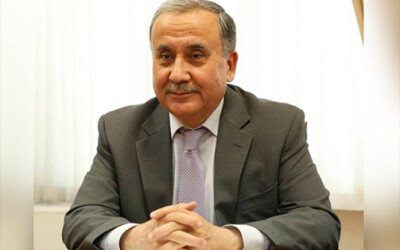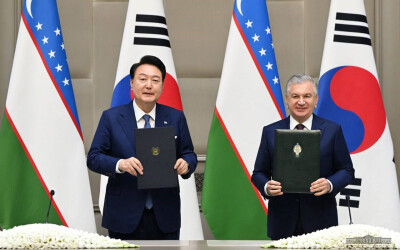Presidents of Uzbekistan and the Republic of Korea emphasized the importance of strengthening cultural and humanitarian ties

On 13-15 June, the state visit of the President of the Republic of Korea Yoon Suk Yeol to Uzbekistan took place, which gave a new powerful impetus to the development of Uzbek-Korean relations of special strategic partnership. Today, Uzbekistan is the only country in Central Asia that has such a high level of cooperation with South Korea.
During the high-level negotiations, a wide range of issues were discussed on further deepening and expanding multifaceted interaction in areas of mutual interest.
The parties paid special attention to partnership in the cultural and humanitarian sphere, which serves as an important foundation in strengthening the bonds of friendship, good neighborliness, mutual understanding and rapprochement of the two states. As the head of our state stated: “Although Uzbekistan and South Korea are separated by a significant distance, our peoples have similar customs and values, mentality and worldview.”
As you know, of all the CIS countries, the largest Korean diaspora lives in Uzbekistan, which numbers more than 200 thousand people. They are an integral part of our multinational people and actively participate in all spheres of society and the state.
All conditions have been created for representatives of Korean nationality to maintain their sociocultural identity, preserve and popularize culture, traditions, customs, art and language. Since 1991, the Association of Korean Cultural Centers of Uzbekistan has been operating; in 2019, the House of Korean Culture and Art was opened in Tashkent. To celebrate the 90th anniversary of the Korean diaspora in 2027, the parties agreed to open a museum and library in the building of the House of Culture.
In order to get acquainted with the rich and unique cultural and historical heritage of the two countries, an agreement was reached to declare 2025 the “Year of Mutual Exchanges between Uzbekistan and South Korea.” In particular, cultural weeks, youth, educational, language and sports forums, art and craft exhibitions, and tourism fairs will be organized. This measure will increase tourist flows between the countries, which will bring economic benefits to both and further strengthen bilateral relations.
Along with this, the heads of Uzbekistan and South Korea paid special attention to the implementation of joint programs in the field of education.
In recent years, the educational sphere has been an “anchor” area that allows to increase cooperation in training personnel for our country based on the best global practices and advanced standards. Universities of Uzbekistan maintain contacts with more than 45 universities and scientific and educational departments of Korea. There are 4 branches of leading Korean universities successfully operating in the republic: Inha, Bucheon, Aju in Tashkent and the Korean International University in Fergana. In turn, over 11 thousand Uzbek students study in South Korea.
Proposals to create an institute in our country based on the model of the Korea Institute of Science and Technology (KAIST) were discussed. Today it is the leading educational and research university in South Korea, which trains specialists in the field of engineering and nanotechnology. According to the QS World University Rankings, KAIST is ranked 41st in the world. The opening of a similar educational institution in Uzbekistan will allow training in the most popular areas of science and specialties today.
Two nations are also working on opening, in partnership with the Korean Institute of Public Administration and the National Institute of Human Resources, a Center for Training in Digital Technologies and Artificial Intelligence at the Academy of Public Administration in Tashkent. The development of digital technologies based on artificial intelligence is designated as a priority direction of the ongoing large-scale economic development plan for South Korea - “New Growth Strategy 4.0”. Our country also attaches special importance to this area, having adopted the “Digital Uzbekistan - 2030” Strategy in 2020. The creation of such a Center meets the aspirations of both states, as it will facilitate the exchange of experience and skills in training specialists in this field.
Another important area discussed during the negotiations between Sh. Mirziyoyev and Yun Sok Yeol was the healthcare sector. South Korea provides great assistance to Uzbekistan in creating medical centers, improving the qualifications of medical personnel, equipping national medical institutions with modern equipment, exchanging experience in protecting maternal and child health, hereditary diseases, etc.
Thus, in 2020, with the assistance of the Korean EDCF, the construction of a modern multidisciplinary children's clinic in Tashkent was completed. The implementation of a joint medical cluster is in full swing, including the creation of a university, a hospital, an oncology clinic and a pharmaceutical cluster. As a result of the negotiations, the parties agreed to implement the second stage of the Pharma Park pharmaceutical cluster project and launch a long-term program to improve the skills of medical workers in leading clinics in South Korea.
To summarize, it can be confidently noted that Yoon Su Yeol’s visit to Uzbekistan was an important milestone in the deepening of Uzbek-Korean relations and demonstrated the steady desire of the two countries to fill the special strategic partnership with even more practical content.
Madina Aripova,
Chief Researcher, ISRS
under the President of the Republic of Uzbekistan
Previous

In international relations, bilateral summits often serve as turning points that can significantly influence the trajectory of ties between countries. This happened on June 6, 2024, when the President of Uzbekistan Shavkat Mirziyoyev went on a landmark visit to Türkiye. This event was not just a routine diplomatic event. It was testimony to the growing partnership and shared vision between the two nations.
11.06.2024Next

On 13-15 June, the first visit of the President of the Republic of Korea Yoon Suk Yeol to Uzbekistan took place. The program of the South Korean leader’s stay was very informative and included high-level negotiations, a visit to the Tashkent Technopark and participation in a joint business forum.
16.06.2024





